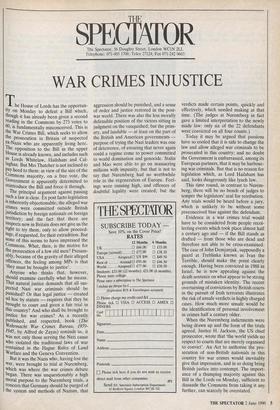THE
SPECTATOR
The Spectator, 56 Doughty Street, London WC1N 2LL Telephone: 071-405 1706; Telex 27124; Fax 071-242 0603
WAR CRIMES INJUSTICE
The principal argument against passing such a law is clear. Ex post facto legiSlation is inherently objectionable; the alleged war crimes were committed outside British jurisdiction by foreign nationals on foreign territory; and the fact that there are suspects now in Britain does not give us the right to try them, only to allow proceed- ings, if requested, for their extradition. But none of this seems to have impressed the Commons. What, then, is the motive for the prosecution of a few old men? Presum- ably, because of the gravity of their alleged offences, the feeling among MPs is that they must be brought to justice'.
Anyone who thinks that, however, should examine carefully what he means. That natural justice demands that all sus- pected Nazi war criminals should be Punished? Or that legal justice — created ad hoc by statute — requires that they be brought to court and given a fair trial in this country? And who shall be brought to justice for war crimes? As a recently published, and respected, book (The Wehrmacht War Crimes Bureau, 1939- 1995, by Alfred de Zayas) reminds us, it was not only those serving the Nazi cause who violated the traditional laws of war contained in the Hague Rules of Land Warfare and the Geneva Convention.
But it was the Nazis who, having lost the war, were brought to trial at Nuremberg, which was where the war crimes debate began. There was unquestionably a high moral purpose to the Nuremberg trials, a Concern that Germany should be purged of the system and methods of Nazism, that aggression should be punished, and a sense of order and justice restored in the post- war world. There was also the less morally defensible position of the victors sitting in judgment on the vanquished; but the prim- ary, and laudable — at least on the part of the British and American governments — purpose of trying the Nazi leaders was one of deterrence, of ensuring that never again could a regime come to power committed to world domination and genocide. Stalin and Mao were able to go on massacring millions with impunity, but that is not to say that Nuremberg had no worthwhile role in the regeneration of Europe. Feel- ings were running high, and offences of doubtful legality were created; but the verdicts made certain points, quickly and effectively, which needed making at that time. (The judges at Nuremberg in fact gave a limited interpretation to the newly made law: only six of the 22 defendants were convicted on all four counts.) Today it may be argued that passions have so cooled that it is safe to change the law and allow alleged war criminals to be prosecuted in this country; and no doubt the Government is embarrassed, among its European partners, that it may be harbour- ing war criminals. But that is no reason for legislation which, as Lord Hailsham has said, looks dangerously like lynch law.
This time round, in contrast to Nurem- berg, there will be no bench of judges to temper the legislators' zeal for retribution. Any trials would be heard before a jury, which is unlikely to be without some preconceived bias against the defendant.
Evidence in a war crimes trial would have to be considered from people recol- lecting events which took place almost half a century ago and — if the Bill stands as drafted — from those who are dead and therefore not able to be cross-examined. The case of John Demjanjuk, supposedly a guard at Treblinka known as Ivan the Terrible, should make the point clearly enough. Having been convicted in 1988 in Israel, he is now appealing against the death sentence on what appear to be strong grounds of mistaken identity. The recent overturning of convictions by British courts in the pursuit of Irish terrorists illustrates the risk of unsafe verdicts in highly charged cases. How much more unsafe would be the identification of personal involvement in crimes half a century older.
When the Nuremberg indictments were being drawn up and the form of the trials agreed, Justice H. Jackson, the US chief prosecutor, wrote that 'the world yields no respect to courts that are merely organised to convict'. An Act to authorise the pro- secution of non-British nationals in this country for war crimes would inevitably give that impression, and in so doing bring British justice into contempt. The import- ance of a thumping majority against this Bill in the Lords on Monday, sufficient to dissuade the Commons from taking it any further, can scarcely be overstated.


















































 Previous page
Previous page